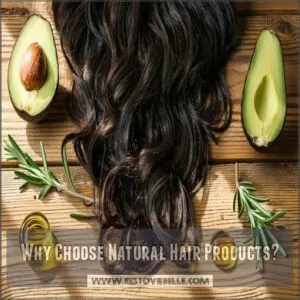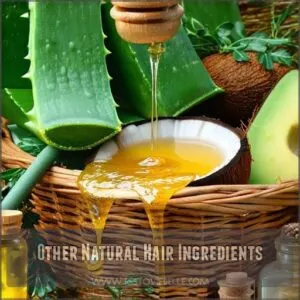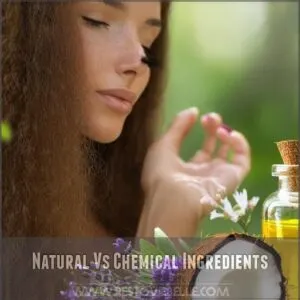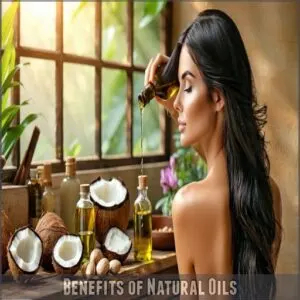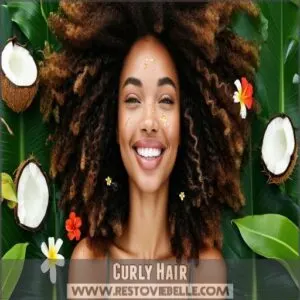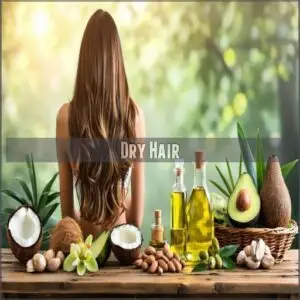This site is supported by our readers. We may earn a commission, at no cost to you, if you purchase through links.
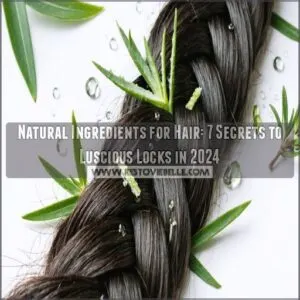 Discover the power of natural ingredients for hair and transform your tresses from dull to dazzling!
Discover the power of natural ingredients for hair and transform your tresses from dull to dazzling!
Coconut oil works magic by repairing damage and moisturizing strands, while tea tree oil battles dandruff with its antimicrobial superpowers. Aloe vera soothes your scalp with its healing amino acids.
Seaweed’s marine nutrients strengthen your hair from root to tip. Whether you’re battling dry ends, fighting frizz, or seeking vibrant color, nature’s botanical arsenal has your back.
These potent, chemical-free solutions don’t just cover up hair problems—they heal and nourish, giving you the luscious, healthy locks you’ve always dreamed of.
Table Of Contents
- Key Takeaways
- Why Choose Natural Hair Products?
- Other Natural Hair Ingredients
- Natural Vs Chemical Ingredients
- Benefits of Natural Oils
- Using Natural Oils on Different Hair Types
- Natural Solutions for Scalp Issues
- DIY Natural Hair Recipes
- When to See a Specialist
- Frequently Asked Questions (FAQs)
- What are the best ingredients for natural hair?
- What are the best natural oils for hair growth?
- What foods are good for hair growth?
- How can natural remedies help with hair growth?
- How to moisturize hair naturally?
- Are natural oils the secret to a healthy hair?
- What is the best natural ingredient for hair?
- Which herb is the king of hair?
- What are the natural essentials for hair?
- How can I make my hair good naturally?
- Conclusion
Key Takeaways
- You’ll transform your hair by choosing natural ingredients like coconut oil and tea tree oil that nourish and repair your strands from the inside out, addressing damage and scalp health without harsh chemicals.
- Your hair’s unique needs matter – different natural oils work best for specific hair types, whether you’re battling dryness, managing curls, or protecting color-treated locks.
- You can leverage powerful botanical ingredients like rosemary oil, aloe vera, and seaweed to stimulate hair growth, fight dandruff, and strengthen hair follicles naturally.
- You’ll save money and protect your hair’s long-term health by creating DIY treatments using kitchen ingredients and avoiding synthetic products that can strip away essential oils and cause scalp irritation.
Why Choose Natural Hair Products?
You’re bombarded with chemical-laden hair products that promise miracles but often deliver damage.
By choosing natural ingredients, you’ll harness the power of plant-based solutions that nourish, strengthen, and transform your hair from root to tip.
Coconut Oil Repairs Damage
Ever wondered how to rescue your hair from damage? Coconut oil is your secret weapon for hair restoration.
- Imagine your hair drinking in deep, nourishing moisture like a parched desert landscape
Packed with protective properties, this natural hair moisturizer penetrates each strand, reducing protein loss and strengthening from within. It’s not just an oil – it’s your hair’s personal bodyguard, transforming brittle, healthy strands into resilient, healthy strands.
Tea Tree Oil Fights Dandruff
Frustrated by persistent dandruff? One powerful ally in your hair care arsenal is tea tree oil, a natural dandruff treatment that tackles scalp health head-on.
This potent essential oil wages war against fungal infections, eliminating those pesky white flakes with its antimicrobial superpowers. By adding just a few drops to your shampoo or mixing with a carrier oil, you’ll transform your scalp care routine.
Additionally, using clove oil benefits can also promote healthy hair growth and prevent dandruff. Gently massage into your scalp to experience its soothing, healing properties and say goodbye to embarrassing flakes.
Your hair will thank you.
Seaweed Strengthens Hair
After battling dandruff with tea tree oil, let’s explore another marine marvel: seaweed.
Packed with marine nutrients, this powerhouse ingredient strengthens hair from root to tip. Your strands drink up kelp’s rich vitamins and minerals, boosting elasticity and resilience.
Seaweed-infused treatments work like a natural hair fortification system, transforming weak locks into a vibrant, healthy mane that’s ready to shine.
Other Natural Hair Ingredients
You’ve got a treasure trove of natural ingredients waiting to transform your hair’s health and appearance.
From aloe vera‘s soothing properties to honey‘s hydrating magic and tea tree oil’s scalp-cleansing power, these botanical wonders can revolutionize your hair care routine without harsh chemicals.
Aloe Vera
Looking to rescue your hair from damage? Aloe vera is your green-bottled superhero.
This miracle plant packs a punch with amino acids that repair and condition, while its polysaccharides lock in moisture for even the most rebellious locks.
Smooth pure aloe vera gel directly on your scalp to balance oils, boost hair regrowth, and calm inflammation.
With vitamins B, C, and E, this natural ingredient transforms stressed strands into a healthy, hydrated mane that’s ready to turn heads.
Honey
Honey is a powerhouse for hair hydration and nourishment. This natural sweetener softens dry strands, seals in moisture, and fights frizz while adding a dazzling shine. Whether mixed into conditioners or used in DIY Honey Masks, it’s a go-to for healthy locks.
For ideal results, using honey hair care products can enhance the natural benefits of honey on hair.
- Locks in moisture to repair dry, brittle hair.
- Reduces frizz, leaving hair more manageable.
- Adds shine for that salon-fresh look.
Tea Tree Oil
Tea tree oil is like a superhero for your scalp—armed with antifungal properties to tackle dandruff and irritation.
It’s not just about fighting flakes; this powerful oil also unclogs hair follicles, promoting healthier regrowth. For an effective scalp treatment, dilute tea tree oil with a carrier oil like coconut or olive oil.
Understanding hair growth benefits is essential for choosing the right natural ingredients. Massage it gently, letting the natural ingredients for hair work their magic overnight.
That cooling sensation? It’s proof your scalp’s getting refreshed. Remember, pure tea tree oil can be strong—keep it diluted for safe, soothing hair care and growth.
Natural Vs Chemical Ingredients
Your hair deserves a little love, not harsh treatment. Chemicals often come with risks—sulfates strip your natural oils, parabens meddle with hormones, and synthetic ingredients irritate both your scalp and the planet. Natural options? They’re packed with nutrients that nourish gently, keeping your locks happy and healthy. Understanding hazardous ingredients is important for making informed decisions about your hair care routine.
Here’s a quick comparison:
| Chemical Risks | Natural Benefits |
|---|---|
| Strips essential oils | Retains moisture |
| Scalp irritation | Soothes scalps |
| Environmental harm | Eco-friendly |
| Hormonal disruptions | Safe for you |
| Short-term results | Long-term hair health |
Want hair safety? Try natural ingredients and organic alternatives like coconut oil and botanical cleansers. Your strands will thank you!
Benefits of Natural Oils
You’ll be amazed at how natural oils can transform your hair by nourishing it from root to tip.
From coconut oil’s moisturizing power to argan oil’s ability to heal damage, these oils are like nature’s way of giving your locks some extra love.
Coconut Oil Moisturizes Hair
Struggling with hair dryness? Coconut oil is your go-to for hydration techniques and scalp nourishment.
Packed with fatty acids, it dives deep into each strand, locking in moisture and taming frizz. Coconut oil benefits include unbeatable moisture retention, leaving your hair soft, shiny, and healthy.
Understanding hair porosity is important to maximize the benefits of coconut oil for your hair type.
Say goodbye to brittle strands—coconut oil hair care is the ultimate solution for natural hair hydration.
– Argan Oil Heals Damage
Riding the wave from coconut oil’s moisture magic, argan oil emerges as a damage-defying champion. This liquid gold penetrates hair follicles, regenerating cells and fortifying keratin with its powerful fatty acids.
Antioxidants battle free radical invaders, sealing split ends and protecting your strands. A few drops before styling can transform brittle hair into silky perfection.
To learn more about the benefits of argan oil for hair care, explore the various ways to incorporate it into your routine. Pro tip: Mix with coconut oil for an extra moisture boost, but always patch test first to confirm your hair’s happy dance.
Using Natural Oils on Different Hair Types
Not all oils are created equal for your hair type, and choosing the right natural oil can transform your locks from lackluster to luscious.
You’ll discover how specific oils like coconut, argan, and rosemary can target your unique hair challenges, whether you’re battling dryness, managing curls, or protecting color-treated tresses.
Curly Hair
After conquering natural oils’ benefits, let’s zero in on curly hair’s unique needs.
Coconut oil becomes your curl’s best friend, penetrating deep to lock in moisture and fight protein loss. It’s like a hydration superhero for your ringlets, taming frizz and defining those beautiful curls with nature’s most powerful hair elixir.
Using coconut oil products can enhance the health of your curls. Your curls will thank you.
Dry Hair
If your hair’s thirsting for moisture, you’re not alone. Natural hydration techniques can transform dry, brittle strands into silky smooth locks.
Opt for nourishing oils like coconut and argan that penetrate deep into hair shafts, combating dryness causes with minimal effort. Homemade remedies using natural ingredients can be your secret weapon – think avocado masks or olive oil treatments.
Remember, dry hair craves gentle care: skip harsh sulfates, embrace moisturizing ingredients, and let natural oils work their magic. Your hair will thank you.
Colored Hair
Sliding from dry to dyed hair? Your colored locks need extra TLC. Natural oils are your secret weapon against color fading and damage. Here’s how to keep your color vibrant and your hair healthy:
- Embrace the rainbow of natural protection
- Seal in moisture like a pro
- Swap harsh chemicals for plant-powered care
- Transform your hair care routine
Avocado and olive oils work miracles, sealing cuticles and preserving your color’s brilliance. Sulfate-free shampoos, lukewarm water, and minimal heat styling will be your new best friends.
Natural Solutions for Scalp Issues
You’ve been battling scalp issues like dandruff or excessive oiliness, and it’s time to turn to nature’s powerful remedies.
With targeted natural ingredients like tea tree oil, rosemary, and clay, you’ll discover effective solutions that can restore your scalp’s health and bring back your hair’s natural shine.
Dandruff
Battling dandruff? Tea tree oil’s your secret weapon!
This natural powerhouse tackles the fungus causing those pesky white flakes while soothing scalp inflammation. Just massage a few drops into your roots before shampooing for a clean, flake-free scalp.
| Dandruff Cause | Natural Remedy | Effectiveness |
|---|---|---|
| Fungal Growth | Tea Tree Oil | High |
| Dry Scalp | Aloe Vera | Moderate |
| Sebum Buildup | Apple Cider Vinegar | Moderate |
| Stress | Scalp Massage | Low |
Oily Scalp
Wrestling with an oily scalp can feel like a never-ending battle, but natural ingredients are your secret weapon. Tea tree oil emerges as a game-changer for sebum control and scalp cleansing. Using a tea tree shampoo can be particularly effective in managing oily scalp issues.
- Target excess oil with daily tea tree oil shampoo treatments
- Balance scalp health using natural astringents
- Apply clay treatments to absorb oil buildup
- Incorporate essential oils that regulate sebum production
By harnessing these natural hair care strategies, you’ll transform your oily scalp from greasy to gorgeous, restoring your hair’s natural harmony and radiance.
DIY Natural Hair Recipes
Your kitchen’s a goldmine for DIY hair masks that’ll transform your locks without breaking the bank. Using natural hair products can save you money and avoid toxic chemicals.
Check out these natural hair remedy powerhouses:
| Ingredient | Hair Benefit |
|---|---|
| Banana | Moisturizes & strengthens |
| Avocado | Deep conditioning |
| Tea Rinse | Natural highlights |
Blend ripe bananas with coconut milk for a protein-packed treatment. Mash avocados with argan oil to revive dry ends. Brew black tea for subtle color enhancement. These homemade conditioners pack a punch, giving you salon-worthy results straight from your pantry – no chemicals, just pure, natural hair love.
When to See a Specialist
DIY hair masks and home remedies can work wonders, but sometimes they’re just Band-Aids on a bigger problem. If you’re noticing excessive shedding, sudden hair loss, or unusual scalp irritation, it’s time to call in the pros.
Trichologists are like hair detectives, pinpointing underlying conditions that might be sabotaging your hair health. To address the root cause of hair loss, understanding how to increase blood flow is essential for overall hair health.
Think of a specialist as your hair’s personal bodyguard. They’ll decode whether your hair loss stems from hormonal hiccups, autoimmune drama, or genetic blueprints.
With advanced diagnostic tools and personalized treatment plans, they can help you reclaim your crowning glory. Don’t let hair loss become your silent struggle. A professional can transform your hair journey from frustration to fabulous.
Frequently Asked Questions (FAQs)
What are the best ingredients for natural hair?
Healthy, happy hair demands divine ingredients! Coconut, rosemary, and avocado oils nourish your locks.
Seaweed controls scalp oil, while honey hydrates.
Rosemary essential oil stimulates growth, preventing shedding without harsh side effects.
What are the best natural oils for hair growth?
You’ll want coconut, argan, and rosemary oils to boost hair growth. These powerhouse oils nourish your scalp, stimulate follicles, and fight inflammation, giving you stronger, thicker locks without harsh chemicals.
What foods are good for hair growth?
Picture your plate as a growth-boosting arsenal.
Eggs, salmon, spinach, and nuts pack protein, omega-3s, and iron.
These nourish your follicles, combat hair loss, and spark vibrant, resilient strands that turn heads wherever you go.
How can natural remedies help with hair growth?
Natural remedies like rosemary oil, coconut oil, and aloe vera can stimulate hair growth by nourishing your scalp, blocking DHT, and promoting follicle health.
These botanical powerhouses offer a gentle, effective approach to strengthening your hair naturally.
How to moisturize hair naturally?
You’ll lock in moisture by massaging coconut or argan oil into your hair’s ends. Aloe vera gel and honey work wonders too.
Try weekly deep conditioning with these natural hydrators to keep your locks soft and supple.
Are natural oils the secret to a healthy hair?
Natural oils can be your mane’s magic potion, nourishing, strengthening, and reviving your locks.
They’ll turn damaged strands into a head-turning, healthy crown of glory.
With 93% of users seeing hair transformation results.
What is the best natural ingredient for hair?
Rosemary oil tops the chart for hair health. It stimulates growth, reduces shedding, and strengthens follicles without harsh side effects.
Packed with nutrients, this natural powerhouse can transform your hair from lifeless to luscious.
Which herb is the king of hair?
If you’re battling hair woes, rosemary’s your secret weapon.
This herbal hero stimulates growth, fights hair loss, and boosts thickness without harsh chemicals.
It’s nature’s prescription for luscious, resilient locks that’ll make heads turn.
What are the natural essentials for hair?
Your hair craves nature’s touch, like seeds nurturing a garden’s growth.
Essential oils, like rosemary and coconut, are rich in nutrients, vitamins, and antioxidants.
These work magic to strengthen, hydrate, and revive your locks from root to tip.
How can I make my hair good naturally?
Nourish your hair naturally by massaging with coconut or rosemary oil and applying aloe vera.
Eat protein-rich foods and manage stress.
Use gentle, natural hair care products that promote scalp health and hair growth.
Conclusion
Discover your hair’s true potential by embracing natural ingredients for hair. From dry, lifeless strands to vibrant, nourished locks, your journey starts now.
Nature’s botanical treasures offer more than temporary fixes—they’re your hair’s long-term allies. By choosing natural solutions, you’re not just styling; you’re healing, strengthening, and transforming.
Trust in the power of coconut, tea tree, and seaweed to revolutionize your hair care routine, revealing the gorgeous, healthy tresses you’ve always desired.
- https://subscribe.allure.com/subscribe/allure/105005
- https://www.ncbi.nlm.nih.gov/pmc/articles/PMC5623966/
- https://pubmed.ncbi.nlm.nih.gov/16019622/
- https://www.cafeyn.co/fr/article/9dd02e/sante-magazine/2023-01-19/pourquoi-et-comment-utiliser-des-huiles-essentielles-pour-soigner-ses-cheveux
- https://sovrn.co/ti17wms

